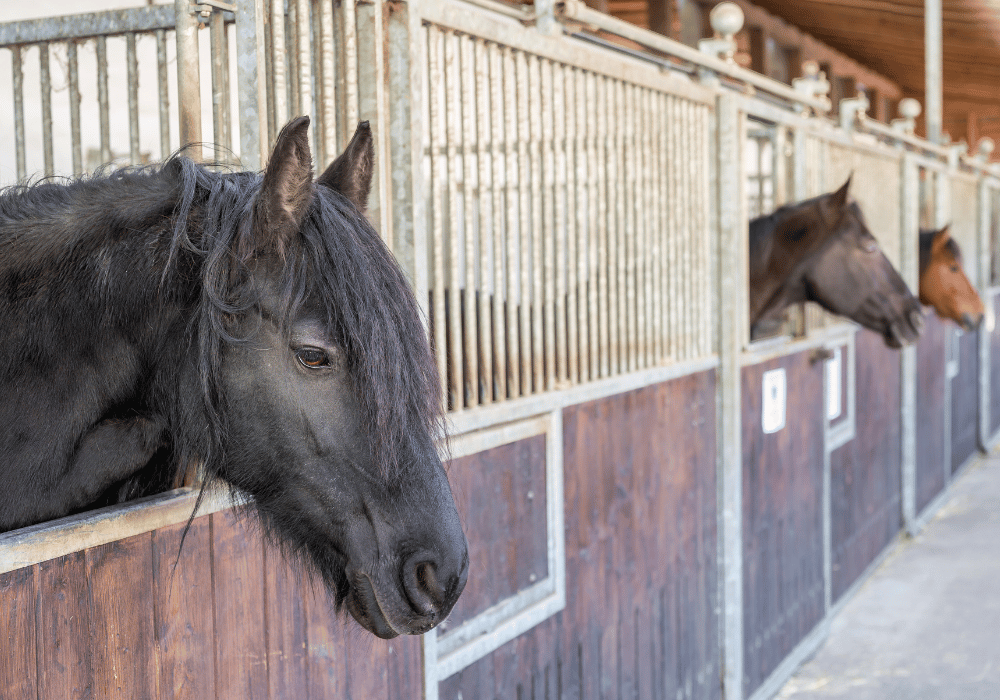Equine strangles is a potentially fatal disease, and its ability to spread makes it even more paramount that it’s both managed and treated properly. This disease can affect any horse, and whilst most horses do make a full recovery, complications can be life-threatening. This blog article outlines the key things horse owners should know about strangles, as well as information on the new Strangvac strangles vaccine for horses.
What is Equine Strangles?
Equine strangles is a disease that affects a horse’s upper respiratory tract. It is caused by a bacteria called Streptococcus equi. This bacteria affects lymph nodes which then become swollen and can abscess. The swollen lymph nodes can press on the respiratory tract, and the name ‘strangles’ refers to the strangled breathing sound a horse might make as this occurs.
Symptoms of equine strangles include a thick nasal discharge, swollen lymph nodes, abscesses on the lymph nodes, coughing, loss of appetite and difficulty both breathing and swallowing.
How Common Is Equine Strangles?
Strangles is one of the most commonly diagnosed infectious diseases in horses worldwide. Its ability to spread is what makes it so common. This disease can spread through horse-to-horse contact and contaminated water, plus it can live on surfaces such as boot treads and tools for weeks at a time.
Equine Strangles Treatment
Horses with strangles require veterinary attention. Treatment centres around supportive care, whilst the horse’s own immune system combats the infection. Your vet will advise you on the best course of action.
If you suspect strangles you should:
- Isolate the infected horse - the horse should have its own water and feed bucket, and no equipment or tools used in the infected horse’s stable should be used near other horses
- Call your vet
- Contact the owner of any horse who has been in contact with the infected horse
- Monitor any other horses on the yard for signs of infection, taking rectal temperatures twice daily is the most sensitive way to monitor for developing infection.
- Inform nearby equine properties of the outbreak, as well as anyone who has visited your yard such as the farrier
It can be up to 6 weeks before a horse has fully recovered from equine strangles. Around 70% of horses who recover from strangles will have an immunity to the bacteria which can last for 5 years or more. You can find out more about equine strangles treatment and what to do in the event of an outbreak in our guide.
Prevention of Equine Strangles
Equine strangles is highly contagious, and it is paramount that horse owners and yard managers are proactive in order to prevent an outbreak. Being equine strangles aware is key to preventing outbreaks and minimising their impact should they occur. You can learn more about equine strangles awareness in our guide.
Intensive biosecurity measures can lower the risk of a horse contracting equine strangles in the first place. New horses entering a yard should be quarantined for 3 to 4 weeks. Separate buckets, equipment and grooming kits should be used for each horse. Staff should move from the lowest risk group to the highest risk groups when carrying out yard duties. You can learn more about equine biosecurity in our guide, and read our biosecurity case study for an example of excellent biosecurity in practice.
A blood test can be used to identify horses that have increased antibody responses to S. equi and have been exposed in the past. This allows yard managers to determine whether a horse is high risk before symptoms appear.
Strangvac Strangles Vaccine for Horses
A new strangles vaccine named Strangvac has recently become available. This vaccine offers advantages over previous vaccines, which have not been used widely in the UK.
Strangvac is up to 94% effective at preventing or reducing infection in vaccinated horses. It reduces clinical signs including a high temperature, coughing, difficulty swallowing and lymph node abscesses. While the vaccine does not stop horses from catching strangles, it can minimise clinical signs and help horses to recover faster if they do contract the disease.
Equine Vaccinations at Avonvale Equine Vet Practice
While equine strangles is rarely fatal, it is essential that vets, yard managers and horse owners work together to prevent an outbreak. Avonvale Equine Vet Practice provides routine and emergency vet care to all equines. If you require advice on the new equine strangles vaccination or wish to find out more, feel free to contact us on 01295 670 501.








